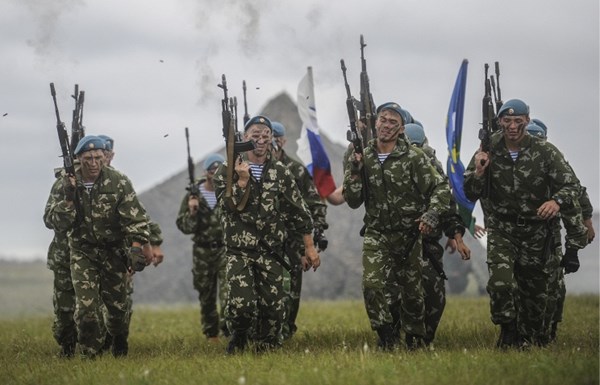Russia's Kharkiv offensive turns catastrophic: Ukrainian Forces decimate elite brigade
The Russian advance in the Kharkiv region is turning into a devastating slaughter for the Russian military. Ukrainian Forces have reportedly decimated the elite 83rd Airborne Brigade in the town of Vovchansk. Focus investigates the developments on the Kharkiv front.
Russia's offensive, aimed at capturing a broad area and bringing heavy artillery closer to Kharkiv or even launching an assault on the city itself, has failed, according to Forbes. "As of several weeks after the 9th of May offensive began, around 30,000 Russian soldiers are stuck in Vovchansk, just a few miles south of the Russian border."
Kharkiv, located merely 40 kilometers from the Russian border, has been under continuous alert with sirens and explosions throughout the day and night.
Over more than a month, the situation along the Kharkiv border has fluctuated multiple times. Initial concern post-offensive was that the breakthrough could lead to a ground operation reaching Kharkiv, but rapid redeployment of Ukrainian forces, international arms support, and improved battlefield conditions stemmed the Russian advance. Crucially, the US allowed Ukraine to use Western-supplied artillery and rocket systems against Russian territory, reducing attacks on Kharkiv. However, these missile attacks have been substituted with regular guided bomb strikes, keeping the border conflict active, though the Russian offensive has reduced in recent days.
Military expert Petro Chernyk noted that the situation in Vovchansk is highly volatile, making it difficult to provide accurate battlefield updates. He declined to comment on reports that Russian soldiers are occupying a central parts aggregation plant in the town.
The American Institute for the Study of War (ISW) reported on June 26 that Ukrainian forces had recently regained some lost positions in Vovchansk. Geolocated footage from June 25 shows Ukrainian troops advancing along Soborna Street in central Vovchansk, with Russian soldiers either surrendering or facing heavy casualties at the factory site.
The fighting extends from northeast of Kharkiv near Vovchansk and Tykhe, to the north around Lyptsi and Hlyboke. The Russian forces drew away Ukrainian troops from the south and east, enabling them to halt the advance.
Russia continues to send reinforcements to Kharkiv. According to Colonel Yuriy Povkh of the Kharkiv Ukrainian forces, the Russians plan to deploy the "9th Motorized Brigade of the 51st Army". Lieutenant Colonel Nazar Voloshyn of the Ukrainian Khortytsia troops mentioned Russia's intention to move the 155th Marine Brigade of the Pacific Fleet to the Kharkiv axis to compensate for significant losses.
Experts say that quickly replenishing these troops is unlikely, and it is improbable that Russia can amass enough force to break through one mechanized brigade line in a 3-kilometer wide and 5-kilometer deep area.
Petro Chernyk highlighted that since October 7, 2023, Russian President Vladimir Putin ordered forces to reach the administrative borders of Donetsk and Luhansk regions, marking a new offensive that persists today. Kharkiv is one of the targeted directions.
"This offensive has exhausted about 70% of its capabilities. The Russian army remains offensive, but we've seriously improved in artillery," Chernyk noted, explaining that the artillery power ratio has improved from 1:5 in January to 1:3 now.
However, guided bomb (FAB) strikes complicate the situation—they may not travel as far as ballistic or cruise missiles but are equally destructive. Ukrainian forces need F-16 jets or ATACMS missiles to neutralize them.
While S-300 rocket attacks have lessened, the Russians are adapting their systems for longer-range capabilities.
Despite reduced pressure, Russia still holds potential breakthrough areas. Experts say the Ukrainian army still needs more long-range weapons.
Military expert Ivan Stupak stated that forecasting Russian maneuvers around Kharkiv remains challenging. The noticeable reduction in pressure raises questions about whether another offensive might occur, influenced by both frontlines and negotiation tables.
The Kharkiv offensive reflects Kremlin's political motivations. First, Putin aims to enforce his order to reach Donetsk and Luhansk borders, which he hasn't accomplished by his October 2023 birthday or Victory Day in May 2024.
The Kharkiv operation became crucial for Russia ahead of the peace summit in Switzerland, to maintain an appearance of sustained front-line advantage.
Had troops advanced within 20 km of Kharkiv, the repercussions would have been severe, prolonged havoc on the city, disrupting remaining business operations and cutting off communications with Kupiansk.
